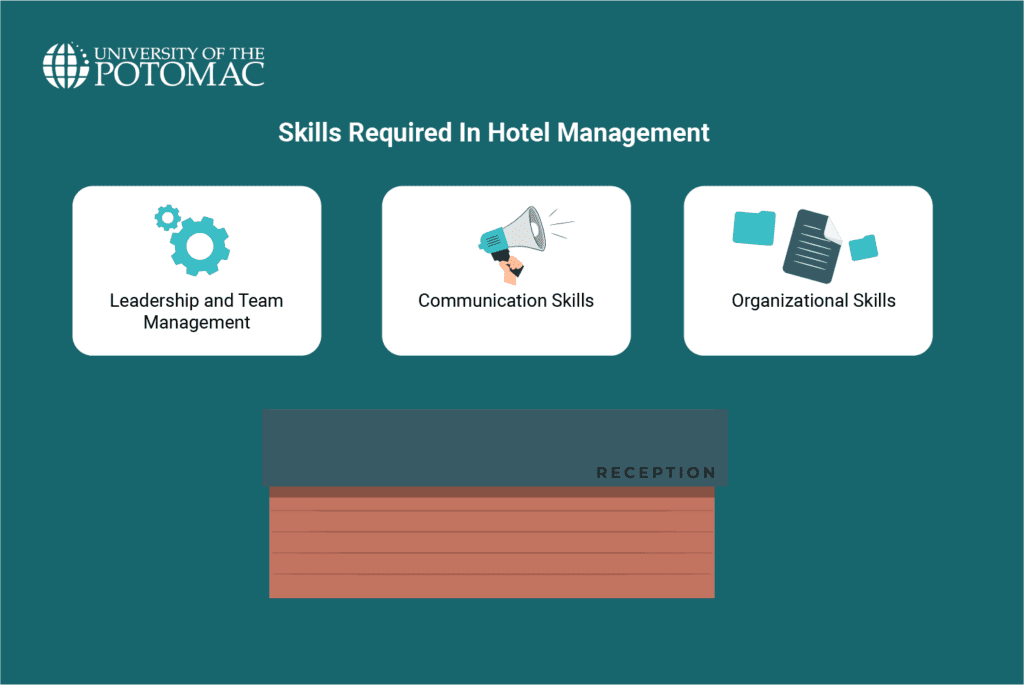- Hotel managers oversee the daily operations of a hotel or similar lodging establishment.
- Key skills required in hotel management include leadership and management, communication, and organizational skills.
- To become a hotel manager, you need to obtain a degree in a relevant field, gain hands-on experience, and obtain certifications.
- Benefits of a hotel management career include: diverse career opportunities, job stability, global exposure, fast-paced environment, career advancement, job satisfaction, etc.
Did you know? The global hotel and resort industry reached 1.5 trillion US dollars in 2023. This is about the GDP of Spain, one of the leading European economies.
But who are the people that are spearheading the growth of this industry?
Well, apart from the executives who make decisions, it is the hotel managers who make possible the industry’s prominent businesses —hotels and resorts—are run efficiently and offer exceptional guest experiences.
But what is hotel management anyway? That’s a question we are about to explore. In this blog post, we examine the role of a hotel manager, how to become one, career paths to choose from, and the benefits that await you in hotel management.
What Is Hotel Management?
Hotel management is a career path in the hospitality industry. It is a professional field dedicated to overseeing and coordinating various aspects of hotel operations. However, it is not limited to hotels only, and includes other similar establishments that provide lodging and other services for guests, such as motels, resorts, etc.
Depending on the size of the hotel or establishment, hotel management may include different tasks like guest service, financial planning, staff coordination, marketing, and ensuring overall guest satisfaction.
What Does A Hotel Manager Do?
A hotel manager is the person behind the wheel who makes the hotel run smoothly, all while ensuring guests have a positive and memorable experience. It is a multifaceted role that requires a daily balance of operational oversight, team leadership, and financial acumen.
The responsibilities of a hotel manager may differ depending on the size and type of establishment. However, some of the key responsibilities of a hotel manager include:
- Managing daily hotel operations (e.g., front desk, housekeeping, and facilities)
- Supervising and coordinating hotel staff
- Handling guest relations and addressing complaints
- Budgeting, financial planning, managing hotel revenue
- Ensuring compliance and safety with regulatory standards
Key Skills Required In Hotel Management

As it is an integrated role, to be successful in this job, you need a skillset that includes technical, interpersonal, and organizational skills. This is because a hotel manager has various responsibilities, from managing daily operations to supervising staff to handling guest complaints. Most importantly, hotel managers must be able to strike a balance between operational efficiency and exceptional customer service. Some of the key skills hotel managers must possess include:
- Leadership and team management: This is literally in the job title. Hotel managers are often the hotel’s general manager, which means they are responsible for leading different departments. A good manager guides and motivates employees, resolves conflicts, and fosters collaboration.
- Communication skills: As the role of hotel managers involves resolving issues, delegating tasks, and maintaining relationships either with staff, guests, and stakeholders, they must possess stellar written and verbal communication skills. This also means they need to be culturally sensitive in their communication, while fluency in multiple languages is a big plus.
- Organizational skills: There’s never a dull moment in hotel management because there is always something to be done or improved. A hotel manager must have excellent organizational skills to stay on top of everything like managing multiple tasks, schedules, and priorities effectively.
- Business acumen: A big part of the hotel managers’ role is keeping track of budgets, ensuring there are no “leaking” costs and revenues are turned into profit. This means they have to know how to plan budgets, forecast, and set clear key performance indicators.
How To Become A Hotel Manager?

The road to becoming a successful hotel manager is paved through education, experience, and certifications. The first step in this process is to earn a hospitality degree. As an aspiring hotel manager, you can obtain an associate’s or bachelor’s degree in hotel management, hospitality, or a related field, e.g., business administration. Although you can get a hotel management job if you have enough experience, an undergraduate hospitality degree is typically preferred.
In addition to education, hands-on experience is essential for becoming a hotel manager. You can gain experience even through entry-level roles such as front desk staff, event coordinator, or restaurant supervisor. Relevant experience in the hospitality industry is crucial to develop the skills necessary to succeed in hotel management. Through these experiences, you can climb the career ladder and make your way up to a management position.
Although not typically required by some employers, obtaining certain certifications can help you increase your earning potential and set you apart from other job applicants. Such a certification is the Certified Hotel Administrator (CHA).
Hotel Management Career Opportunities
If you’re thinking of pursuing a career in hotel management, you’ll be happy to hear that hotel management is rich in the variety of roles it offers, catering to different interests and skill sets. Some of the key roles in hotel management include:
- Front office manager: Manages guest reservations and check-ins as well as front desk staff.
- Food and beverage manager: Oversees all dining services, including restaurants and catering, to ensure the quality of the food and service and customer satisfaction.
- Housekeeping manager: Supervises all cleaning staff to maintain impeccable hygiene.
- Event manager: Plans and coordinates events such as conferences, weddings, and special events within the hotel or establishment.
- General manager: Oversees all hotel operations and leads all departments.
- Marketing and sales manager: Develops marketing campaigns and strategies to promote the hotel.
Career paths and advancement opportunities
The career path to most roles in hotel management starts with entry-level positions such as front desk agent, guest service associate, or housekeeping staff. These roles will provide you with the hands-on training and foundational experience in guest services, operations, and hospitality industry standards you will need as you advance in your career.
Then, as you gain experience, you can move up to mid-level roles, such as a department manager. There are various departments you can manage depending on your interests, such as front desk manager, food and beverage manager, or housekeeping manager. For these roles, you’ll need leadership, problem-solving, and communication skills.
Interested in pursuing a degree?
Fill out the form and get all admission information you need regarding your chosen program.
This will only take a moment.
Message Received!
Thank you for reaching out to us. We will review your message and get right back to you within 24 hours.
If there is an urgent matter and you need to speak to someone immediately you can call at the following phone number:
- We value your privacy.
The next step in your career advancement is a senior-level position. Senior-level roles include a general manager, director of operations, and regional manager (for hotel chains). To advance to such roles, you’ll need extensive industry knowledge, management experience, and a strong strategic vision for business growth.
To really set yourself apart from others, you can always pursue an MBA in hospitality or obtain certifications that equip you with critical managerial skills, business acumen, and specialized knowledge. These skills help you excel in senior roles.
Another exciting career opportunity in hotel management is international assignments in global hotel chains. These assignments help broaden your perspective by exposing you to diverse cultures, practices, and management styles.
Salary expectations and job outlook
As is the case with other professions, the average pay for hotel managers differs depending on the level of experience, location, and property type. However, the average annual salary for hotel managers in the US is $65,360. However, depending on the hotel size, location, or job experience, the salary can go as high as $105,823 annually.
As for the job outlook, the demand for hotel managers in the US is expected to grow 10% by 2033, with about 5,300 new jobs opening every year. This rising demand is due to the increase in international hotel chains, tourist trends, and the rising popularity of boutique and luxury hotels.
Benefits Of A Hotel Management Career

A career in hotel management comes with a lot of responsibilities but perhaps just as many advantages.
As we’ve mentioned above, hotel management offers an abundance of career opportunities, which means you’re sure to find something that suits your interests and skills. There are plenty of opportunities to quickly advance in your career in hotel management, from entry-level positions to senior positions. Moreover, the continuous demand for hotel managers and a faster-than-average job outlook ensure job stability for those who pursue this career path.
Another perk of working in hotel management is that you can have the opportunity to travel and experience different cultures while working for international hotel chains and resorts.
Last but not least, the fast-paced working environment is not for everyone, however, if you are one that appreciates variety, new challenges, and interactions, hotel management is the perfect career for you.
Is Hotel Management The Right Career For You?
It’s easy to get excited about a possible career in hotel management when you consider the benefits, but not everyone is cut out for this job. To succeed in hotel management, you must have a strong work ethic, be adaptable, and have a genuine passion for service. You’ll often be required to work long hours, tackle challenges one after another, and continuously strive to exceed guest expectations.
So, before you decide to pursue a career in hotel management, reflect on your personal preferences and career aspirations. If you thrive in a fast-paced environment, enjoy a people-centered job, and have a passion for service, then this might be the career for you.
Conclusion
In conclusion, hotel management can be a rewarding career if you match the criteria that are required to thrive in this job. This field offers various career opportunities and benefits like job security, high job satisfaction, and global exposure.
If you are considering a career in hotel management, check out Potomac’s Hospitality Program, and be part of the next cohort of successful hotel managers.
Frequently Asked Questions
What is the difference between hotel management and hospitality management?
Hotel management and hospitality management differ in scope and focus. Hotel management involves overseeing the operations of a hotel or other lodging facility, whereas hospitality management encompasses the entire hospitality industry, including hotels, restaurants, tourism, cruise lines, etc.
Can you become a hotel manager without a degree?
Yes, you can become a hotel manager without a degree by working your way up from entry-level positions through experience and strong performance. However, a degree is always a big plus.










